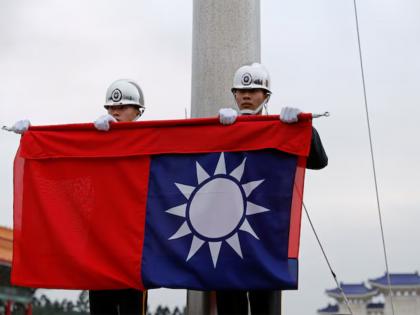Taiwan refutes China's "psychological warfare"; accuses Beijing of violating laws
By ANI | Updated: October 19, 2025 15:05 IST2025-10-19T15:03:19+5:302025-10-19T15:05:04+5:30
Taipei [Taiwan], October 19 : In a fresh act of political provocation, China has accused five Taiwanese technology companies ...

Taiwan refutes China's "psychological warfare"; accuses Beijing of violating laws
Taipei [Taiwan], October 19 : In a fresh act of political provocation, China has accused five Taiwanese technology companies of financing a so-called "psychological warfare unit," a claim that Taipei denounced as yet another attempt by China to intimidate and divide the island's democratic society.
The Mainland Affairs Council (MAC) dismissed the allegations as baseless and malicious, warning that such propaganda campaigns are part of China's wider psychological operations against Taiwan, as reported by The Taipei Times.
According to The Taipei Times, the controversy began when the Xiamen Public Security Bureau published names, photographs, and ID details of 18 individuals it branded as members of a "Taiwanese psychological warfare group."
Chinese state media, including China Central Television's online channel Ri Yue Tan Tian, went further by claiming that "Taiwanese netizens" tipped them off about five local companies: EZTrust Technology Co, LargeitData Inc, DiTV Technolog Co, Digimiracle Tech Co, and MasterConcept Co, allegedly providing financial support to the unit. The MAC, in its sharp response, said Beijing's fabricated legal accusations are a dangerous form of psychological warfare meant to foster fear among the Taiwanese public and business community.
By portraying itself as having legal authority over Taiwan, the Chinese Communist Party (CCP) aims to blur jurisdictional boundaries and spread insecurity, the council stated. It warned that such disinformation campaigns are designed to weaken Taiwan's morale and disrupt its democratic resilience.
The MAC stated that China's intimidation directly contradicts international law and the global rules-based order. Taiwan, it said, remains fully capable of defending its people and private enterprises against foreign coercion. Citizens were urged not to be swayed by Beijing's propaganda or manipulated by fear-mongering reports, as cited by The Taipei Times.
The MAC also reminded that sharing sensitive information with China could violate the National Security Act, National Intelligence Act, or the Criminal Code, carrying prison sentences of up to seven years. The council warned individuals and corporations to not risk their integrity or freedom "for negligible benefits dangled by Beijing."
Through falsehoods and coercive rhetoric, China continues to wage an information war, one that increasingly exposes its desperation to undermine Taiwan's democratic stability, as reported by The Taipei Times.
Disclaimer: This post has been auto-published from an agency feed without any modifications to the text and has not been reviewed by an editor
Open in app